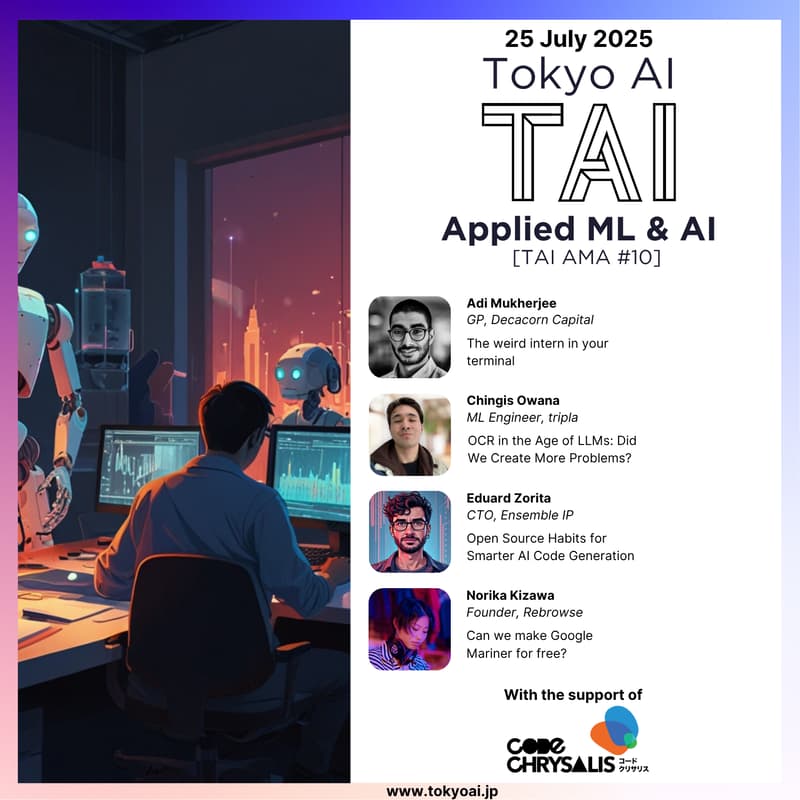

TAI AMA #10 - Taming the Machine: Practical AI for Developers
Summary
This time we'll explore practical ways to improve how we work with AI tools. You'll learn how to turn terminal-based AI agents into reliable coding assistants, uncover the risks of using large language models in OCR tasks, and discover open-source-inspired habits that lead to cleaner, more effective AI-generated code.
Schedule
18:00 Doors open
18:30 - 19:00 "The weird intern in your terminal" (Adi Mukherjee)
19:00 - 19:30 "OCR in the Age of LLMs: Did We Create More Problems?" (Chingis Owana)
19:30 - 20:00 "Open Source Habits for Smarter AI Code Generation" (Eduard Zorita)
20:00 - 20:30 "Can we make Google Mariner for free?" (Norika Kizawa)
20:30 - 21:00 Networking
21:00 Event ends
Talks
Talk 1: The weird intern in your terminal
Speaker: Adi Mukherjee (GP, Decacorn Capital)
Abstract: Terminal agents like Claude Code have seen an explosion in popularity and utility in recent months. While they are impressive out-of-the-box, the capability frontier is jagged, and users are constantly exploring how to get the best, most reliable work out of these tools. This talk presents a collection of tips, tools, configurations, and workflows based on the author's experience that make Claude Code more like an intern in your terminal than just a developer tool. Familiarity with Claude Code will help you get the most out of the tool, but is not required - while the configuration and specific tips may not generalise, the principles apply to all kinds of AI tools.
Bio: Software engineer and investor from London, UK with experience ranging from seed-stage startups to SRE at Apple. Currently on sabbatical: after several months travelling around Japan, now living in Tokyo and working on something new.
Talk 2: OCR in the Age of LLMs: Did We Create More Problems?
Speaker: Chingis Owana (ML Engineer, tripla)
Abstract: Recent progress in large language models and large multimodal models has begun to transform traditional OCR pipelines. Beyond simply extracting text, these systems can reconstruct it, often "helpfully" filling in missing or unclear characters. However, when the input becomes ambiguous or degraded, LLMs tend to rely more on prior knowledge from their training data than on the actual content, leading to confident but incorrect outputs. This talk explores the evolving role of LLMs in OCR, the hidden risks of hallucination, and why traditional evaluation methods are no longer enough.
Bio: A Senior Machine Learning Engineer at tripla in Tokyo, where they focus on search relevancy projects and tackle challenges across domains such as Learning-to-Rank and Natural Language Processing. His current interests include researching and developing data de-biasing solutions for production ML systems, particularly addressing biases arising from implicit feedback and user behavior.
Outside of work, Chingis engages in machine learning research and writes technical blogs for the community, with a keen interest in self-supervised learning, multimodal systems, and representation learning.
Talk 3: Open Source Habits for Smarter AI Code Generation
Speaker: Eduard Zorita (CTO, Ensemble IP)
Abstract: As startups scale, so do the challenges of collaboration, quality, and communication. In this talk, Eduard shares lessons learned while growing a fully remote, multi-disciplinary engineering team — from a solo developer to a group of 15 AI, data, and full-stack engineers. Drawing inspiration from open-source practices, he explores how the same habits that improve human collaboration — like clear planning, iterative review, and shared standards — can also help guide AI tools more effectively, leading to cleaner, more reliable code.
Bio: Eduard is the CTO of Ensemble IP, where he leads a fully remote team building AI systems that harness patent data for advanced analysis and decision-making. With a background in machine learning, data engineering, and software architecture, he applied deep technical expertise to complex, domain-driven challenges—from genomics to underwater robotics to intellectual property.
Talk 4: Can we make Google Mariner for free?
Speaker: Norika Kizawa (CTO, Ensemble IP)
Abstract: Some people think building a browser agent startup right now is basically “suicide”—especially with Google, OpenAI and Perplexity already in the game. I felt that fear too, so I reached out to a few friends who are building similar tools, including one who used to work at Google. What I learned changed my perspective. In this essay, I break down the different technical paths teams are taking, and why I believe the smartest bet is actually the simplest: fast, affordable, and reliable browser agents that don’t try to reinvent the wheel. That’s the approach I’m taking with Rebrowse. I also talk about how startups can punch above their weight by tapping into the open-source AI ecosystem. Yeah, the giants are scary—but they’re also slow and expensive. And in tech, simpler and cheaper usually wins.
Bio: Serial tech entrepreneur and hacker — her first bootstrapped company was ranked among the top 15 AI companies in Japan. Currently building Rebrowse (just started in April), based in Bangalore and San Francisco. Previously 3x CTO, ODF ’22 fellow, and Network School alum.
Supporters
Thanks to Code Chrysalis for their venue support!
Our Community
Tokyo AI (TAI) is the biggest AI community in Japan, with 2,500+ members mainly based in Tokyo (engineers, researchers, investors, product managers, and corporate innovation managers).